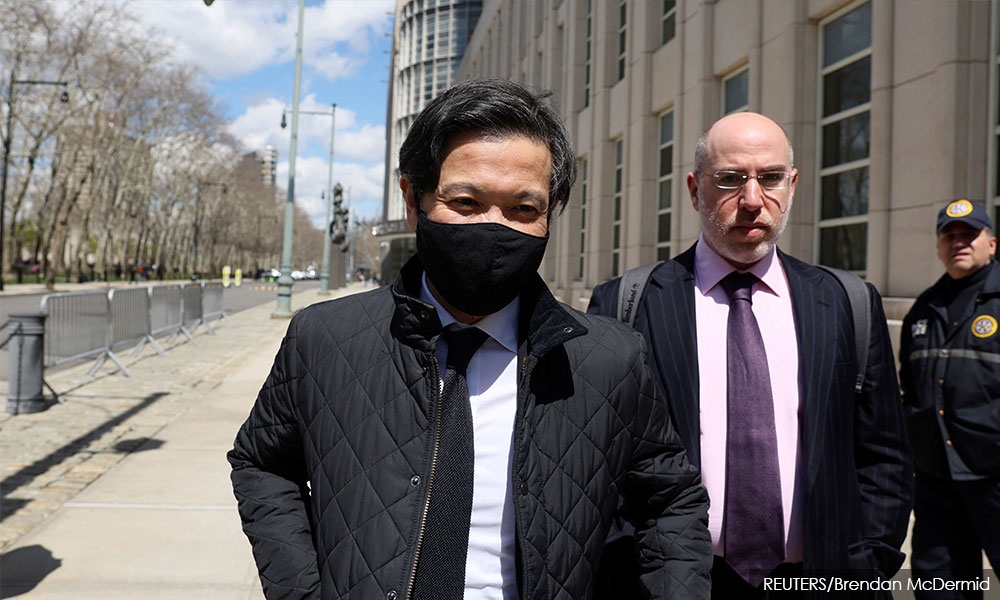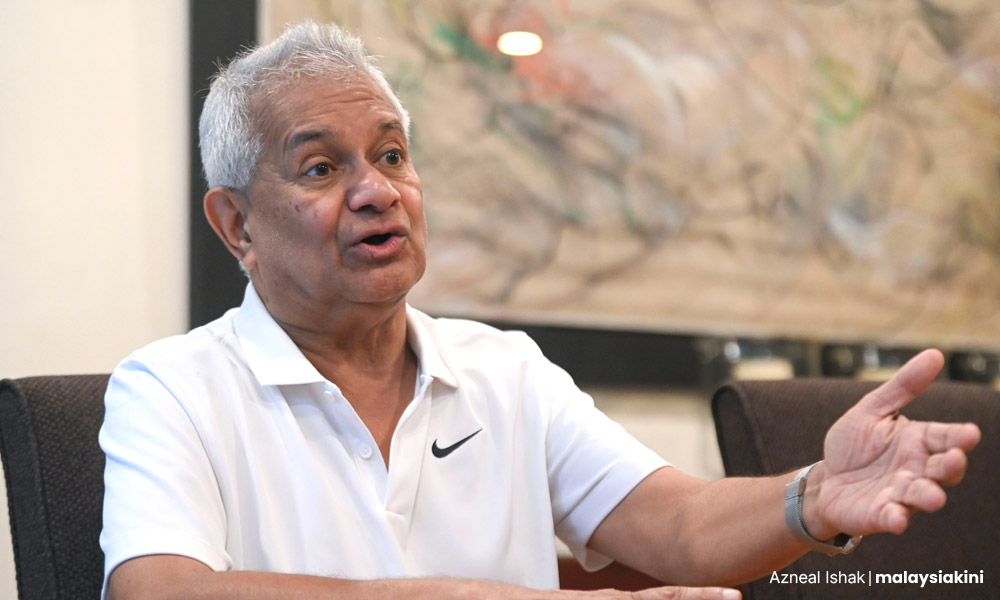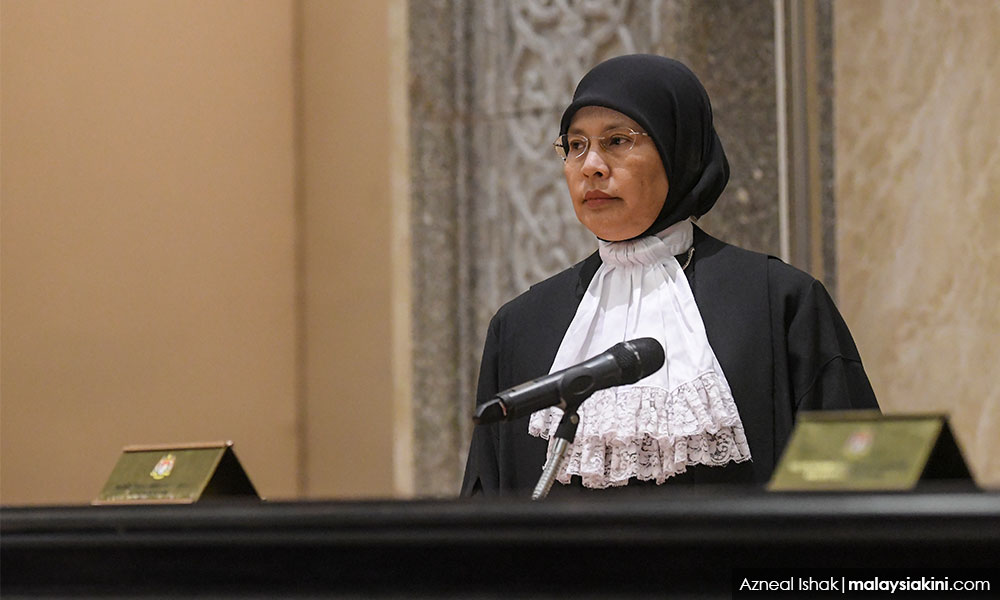EXCLUSIVE | Former prime minister Najib Abdul Razak’s SRC International trial involving RM42 million was a lengthy court process, taking over four years from charging to jail. Former attorney-general Tommy Thomas, who initiated the proceedings, comments on the court process and some ways to speed it up in this second part of an exclusive interview with James Chai and P Gunasegaram.
Malaysiakini: Looking back, in your opinion, do you think that the court bent backwards for Najib - considering the time it took for the case to complete and the kind of objections raised by the defence, there seems to be more leeway than given to an ordinary person?
Tommy Thomas: Well, I would answer it this way. I had considerable trial experience but always on the civil side, and when you do large trials, that means three or four weeks or more, we always say we want it to be completed in one go. So, if it was a four-week trial, give us one month, Monday to Friday every week, the whole month, and civil judges tried to accommodate that.
I said to (trial judge) Justice (Mohd) Nazlan Mohd Ghazali) [to do it in one go], and the reason is very simple - because it is much more efficient for lawyers on both sides and for the court to focus on one case for four weeks, five weeks, two months or three months: it is much more efficient.
Of course, (Najib’s lawyer Muhammad) Shafee (Abdullah) objected, saying it never happened like that in criminal courts. But Justice Nazlan did not deal with my request. The effect was, as you know, the trial was done in phases. So you get two weeks, then break, then three days, then break, and I think the trial lasted 50 or 60 days, but spanning two years.
Elsewhere in the world, in the Roger Ng trial, which happened in the US, it was two weeks. Boris Becker’s trial in London was one week. They went to jail immediately.

Two months, I think, for Roger Ng.
The trial itself was about three weeks. They had a break. So we have a structural problem in Malaysia and it is caused by Malaysian lawyers who don’t want trials to go from beginning to end. So let’s blame the lawyers first, and the courts are also reluctant.
If they had accepted my suggestion, we would have had three months of trial – and then there would have been a reserved judgment, and the judge could give the judgment. And that was what happened in the Court of Appeal and, to some extent, the Federal Court. The Federal Court gave 10 days, the Court of Appeal gave 15 days, so those two appellate courts were more amenable to what we had in mind.
On the point of a structural problem. I remember in your book, you also talked about how, in criminal cases, there is also a requirement in original documents for the maker to be called. And this lengthened the court process a lot. Could you talk about that and whether there are other structural issues in law that made the criminal trials go on for so long?
Some countries have moved forward for white-collar crimes. But Malaysia has not. So Malaysia still requires, in criminal cases, for the original documents to be tendered by the maker. A few minutes ago (in part 1 of the interview), I talked about the resolutions, KWAP’s (civil services pension fund Kumpulan Wang Persaraan) documents, the minutes and so on. So you really have the company secretary turning up and saying, “I was the company secretary at such and such date, here is the original minute book, here are the resolutions, and so forth.”
So, if you don’t have the original documents, it doesn’t get accepted?
That’s right… Whereas in civil cases, everything is done by photocopies and everybody concerned has a bundle of documents: the plaintiff’s lawyers, the defendant’s lawyers, the judge and the witness, all have photocopies. Only if somebody challenges the authenticity of a document - if someone says that it is not a genuine document - would you have to bring the original.
In all my trial experience, there has never been a need to bring the maker because of forgery or the like. So I think in the SRC trial, we called 50 or 60 witnesses, and probably 20 were just makers. They were nominal witnesses. There was not much cross-examination also, as he would just confirm, “Yes, it is my document”.
So other countries have introduced new provisions: insisting on lawyers to exchange documents and reaching an agreement. And if they don’t reach an agreement, then the trial judge would take a very hands-on approach in case management and say, “Look, what are the documents you are objecting? Why? Why do you need the maker? And then the judge rules [on that] before trial, so everything would be smoother.

So one of the things I had in mind when I was attorney-general was to amend the Criminal Procedure Code to have ‘trials by photocopies’. That’s the easiest way to understand. Unfortunately, it did not materialise.
On a related note, from the beginning at the magistrate and the High Court to the end of the Federal Court, the defence lawyers constantly brought up applications like gag orders, adjournment requests to stall the trial. Do you think there is a valid claim to be said that there was a consistent thread to delay proceedings or do you think these applications were valid?
Don’t forget that the litigation process is adversarial and so I may be biased. Typically, a plaintiff who listens to an application by the defendant would think, in his own mind, that it was a waste of time, frivolous and vice versa. That is human nature and likewise between prosecution and defence.
Once you accept this biasness, I thought most of the applications by the defence (in the SRC trials) were frivolous and without merit. I think they were all dismissed. I cannot remember a single application which was upheld. But the defence does it, and it is for the court to make a quick decision, which the judges did in this case.
Where we went wrong was on the adjournments and the time, which I have already explained. Our court system is probably easy on adjournment, and again, that is a Malaysian problem. The Malaysian legal system is notorious for easy adjournments. We always had that. Just like India, which is world famous for easy adjournments, and the consequent delays. It is endemic.
Do you think the system needs to change, and maybe new structures imposed to make trials faster?
I agree, but there is tremendous resistance from the Bar, first of all, so let’s blame lawyers first.
Lawyers, in Malaysia, are the first opponents to any reform. Perhaps we can have a committee of judges, retired judges, the AGC, and the Bar, and decide: “We cannot go on, we must make trials faster and more efficient”. So basically, compel lawyers to improve the system.
The bulk of the defence’s case was contingent on bias. They think that Justice Nazlan at the High Court level was conflicted, as he was legal counsel with Maybank, and subsequently, they tried to recuse (chief justice) Tengku Maimun (Tuan Mat) because of her husband’s Facebook post. Was there bias, and if there were, how likely was it to influence the outcome?
All these things happened at the Federal Court, not in the High Court. So I don’t have personal knowledge as I was not in the Federal Court. And my knowledge is like everybody else’s in the public domain.

But yes, I always comfort my team by telling them that these things happen, and when such applications [of bias] are made, that is a sure sign that the party making such applications do not want to hear the case on the merits.
When you have a weak case on the merits, and the merits could either be law, facts, witnesses, documents or the totality of the case (are we going to win or lose?). When lawyers have weak cases on the merits, they turn to such applications. And this is the oldest trick in the book. So you just have to look at them calmly and coolly, deal with them.
The Federal Court gave them 10 days, which is a real luxury because this was the apex court, typically you’re lucky if you get one day for the hearing of an appeal. Najib got 10 days which was fixed about five months ago. And yet he came to court and did not want to pursue his appeal on the merits. So that tells me about the lack of merits of his appeal.
On that related note, it was shocking to me to see that, at the Federal Court, with some of the best lawyers from both sides, in the end, the defence did not present a single new submission. How rarely does this happen at the apex court?
It was absolutely extraordinary. The best way to understand such behaviour is if you had asked about a week before it happened any barrister or judge in the entire common law world, that is 60 countries (in the British Commonwealth) - it could be Jamaica, Nigeria, India, Hong Kong or Canada, as we all share the same jurisprudence - and if you told the lawyers or the judge in any of these countries, “Look, this is what is going to unfold when the appeal is called up, they are given 10 days, and this is what is going to happen,” all of them would say it could not happen, you are telling a fiction, that is not how lawyers behave.
It was so extraordinary because it was suicidal and kamikaze. Because at the end of the day, the first duty of a lawyer is to his client - to preserve the interest of his client. How is a client’s interest protected by this kamikaze attitude? The client is now in jail.
Nobody in the common law world could have predicted that. They are authors of their own misfortune. It was self-inflicted or self-induced. - Mkini



No comments:
Post a Comment
Note: Only a member of this blog may post a comment.